Photographs: Jason Reed/Reuters
In his 35-minute address to members of both houses of Parliament Obama said, "We will continue to insist to Pakistan's leaders that terrorist safe-havens within their borders are unacceptable, and that the terrorists behind the Mumbai attacks be brought to justice."
The American President added that India and the US were working together, more closely than ever, to counter terrorism.
Noting that the US strategy to disrupt, dismantle and defeat Al Qaeda and its affiliates has to succeed on both sides of the border, Obama said that is why the US has worked with the Pakistani government to address the threat of terrorist networks in the border region.
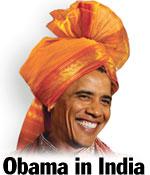
"The Pakistani government increasingly recognises that these networks are not just a threat outside of Pakistan they are a threat to the Pakistani people, who have suffered greatly at the hands of violent extremists," he said.
Paying rich tributes to the victims of the "barbaric" Mumbai attacks in 2008, Obama said he honours the memory of of all those died in the 2001 attack on the Indian Parliament and the Mumbai carnage.
Obama said, "We must also recognise that all of us have interest in both an Afghanistan and a Pakistan that is stable, prosperous and democratic -- and none more so than India."
Earlier in the day, the US president had pushed for resumption of Indo-Pak dialogue and even offered to play a role in resolving the issues if the two countries wanted.
In his speech to Parliament, Obama acknowledged India's contributions in Afghanistan and said it has improved the lives of the Afghan people.
"We're making progress in our mission to break the Taliban's momentum and to train Afghan forces so they can take the lead for their security. And while I have made it clear that American forces will begin the transition to Afghan responsibility next summer, I have also made it clear that America's commitment to the Afghan people will endure," he said.
The US will not abandon the people of Afghanistan or the region "to the violent extremists who threaten us all," he said....
Obama backs India's UNSC bid
Image: Members of Parliament get hooked on to Obama's speechPhotographs: Jason Reed/Reuters
The US President's widely-awaited endorsement of India joining the elite club of permanent members of the UNSC came in the course of the 35-minute address to members of both Houses of Parliament and was greeted with thunderous thumping of desks.
The announcement is seen as a diplomatic gesture although it was clear that the reform of the security council is going to be a long and tedious process. With that in mind, Obama pointedly used the expression "in the years ahead".
In a forthright speech, Obama, however, appeared to be critical of India for not supporting sanctions against Iran over its nuclear programme and not speaking out over human rights abuses in Myanmar where New Delhi has a good relationship with the military junta.
Addressing the gathering that included Vice President Hamid Ansari, Prime Minister Manmohan Singh, Lok Sabha Speaker Meira Kumar, cabinet ministers and Congress president Sonia Gandhi, Obama said that as two global leaders, the US and India can partner for global security, especially as India serves on the security council over the next two years.
"Indeed, the just and sustainable international order that America seeks includes a United Nations that is efficient, effective, credible and legitimate. That is why I can say today in the years ahead, I look forward to a reformed UNSC that includes India as a permanent member," he said.
The US has so far been reticent in expressing support for India's candidature while other permanent members of the security council -- Russia, France and Britain -- have been forthcoming. China, the fifth permanent member, is still non-committal.
"Now, let me suggest that with increased power comes increased responsibility. The UN exists to fulfill its founding ideals of preserving peace and security, promoting global cooperation and advancing human rights," Obama said.
"These are the responsibilities of all nations, but especially those that seek to lead in the 21st century. So, we look forward to working with India, and other nations that aspire to security council memmbership to ensure that the security council is effective; that resolutions are implemented and sanctions; and that we strengthen the international norms which recognise the rights and responsibilities of all nations and individuals," he added.
Obama's bahut dhanyawad remarks floor MPs
Image: MPs greeted Obama's speech with applause at least once a minutePhotographs: Jason Reed/Reuters
The Obama charm offensive continued on Monday and this time he had India's parliamentarians mesmerised. His speech was greeted with tumultuous applause about once a minute.
The American President's bahut dhanyawad remarks while expressing his deepest thanks to the people of India at the start of his speech set the tone for him to strike a chord with the MPs.
Speaking with the help of a teleprompter, 49-year-old Obama, who is the second US President to address Parliament after Bill Clinton in 2000, also evoked laughter when he referred to Chandi Chowk in Old Delhi in a heavy American accent while citing the popular Mughal-era area by way of an example where children deserved a better future.
US promises not to abandon Afghanistan to the extremists
Image: Obama said that major development assistance from India has improved the lives of the Afghan peoplePhotographs: Jason Reed/Reuters
"And while I have made it clear that American forces will begin the transition to Afghan responsibility next summer, I have also made it clear that America's commitment to the Afghan people will endure. The US will not abandon the people of Afghanistan -- or the region -- to the violent extremists who threaten us all," he added.
'India has often shied away from global issues'
Image: Obama criticised India for not speaking out over rights abuses in MyanmarPhotographs: Jason Reed/Reuters
"Every country will follow its own path. No one nation has a monopoly on wisdom, and no nation should ever try to impose its values on another. But when peaceful democratic movements are suppressed -- as in Burma -- then the democracies of the world cannot remain silent," the US president said.
Faced with such gross violations of human rights, it is the responsibility of the international community -- especially leaders like the United States and India -- to condemn it, he added.
"India has often avoided these issues. But speaking up for those who cannot do so for themselves is not interfering in the affairs of other countries. It's not violating the rights of sovereign nations. It's staying true to our democratic principles. It's giving meaning to the human rights that we say are universal. And it sustains the progress that in Asia and around the world has helped turn dictatorships into democracies and ultimately increased our security in the world," Obama said frankly.'Together, we can strengthen agriculture, fight diseases'
Image: Lok Sabha Speaker Meira Kumar greets Obama as vice president Hamid Ansari and Dr Singh watch onPhotographs: Jason Reed/Reuters
Talking about development in the health sector, he said, "Because the wealth of a nation also depends on the health of its people, we'll continue to support India's efforts against diseases like tuberculosis and HIV/AIDS, and as global partners, we'll work to improve global health by preventing the spread of pandemic flu."
Obama also said that Indian and US together can forge partnerships in defence and space. "In short, with India assuming its rightful place in the world, we have an historic opportunity to make the relationship between our two countries a defining partnership of the century ahead. And I believe we can do so by working together in three important areas," the US president said. "First, as global partners we can promote prosperity in both our countries. Together, we can create the high-tech, high-wage jobs of the future. With my visit, we are now ready to begin implementing our civil nuclear agreement. This will help meet India's growing energy needs and create thousands of jobs in both our countries."
He added, "We need to forge partnerships in high-tech sectors like defence and civil space. So we have removed Indian organisations from our so-called entity list. And we'll work to reform our controls on exports. Both of these steps will ensure that Indian companies seeking high-tech trade and technologies from America are treated the same as our closest allies and partners."
From Gandhi to Ambedkar, Obama remembers all
Image: Obama bows to the audience beside Dr Manmohan Singh after delivering the speech at ParliamentPhotographs: Jason Reed/Reuters
Obama quoted Nobel laureate poet Rabindranath Tagore, "Where the mind is without fear and the head is held high," as he recalled India's contribution to world civilisations and the message Swami Vivekananda delivered in 1893 at the Parliament of World Religions in Chicago. It's the richness of faiths celebrated by a visitor to my hometown of Chicago more than a century ago -- the renowned Swami Vivekananda," he said when he dwelt on the "very idea of India".
And as he spoke about his belief that every person can fulfil their god-given potential no matter where he comes from, Obama invoked the father of Indian constitution B R Ambedkar, saying, "Just as a Dalit like Dr Ambedkar could lift himself up and pen the words of the Constitution that protects the rights of all Indians".
But most of all, his speech was dotted with references of Gandhi, the man whom he had hailed two days ago as "a hero not just to India but to the world."
"Just as Gandhiji summoned Indians to seek their destiny, he influenced champions of equality in my own country, including a young Martin Luther King. After making his pilgrimage to India a half century ago, Dr King called Gandhi's philosophy of non-violent resistance 'the only logical and moral approach' in the struggle for justice and progress," the US president said.
Obama said he felt honoured and humbled to visit the residence where Gandhi and King both stayed -- Mani Bhavan -- and the memorial of the father of nation at Rajghat. "We were humbled to pay our respects at Rajghat. And I am mindful that I might not be standing before you today, as President of the United States, had it not been for Gandhi and the message he shared with America and the world," he said.Indo-US relationship, Obama's priority
Image: Union minister Pawan Bansal, Hamid Ansari, Speaker Meira Kumar, Obama and Dr Singh at ParliamentPhotographs: Jason Reed/Reuters
The US President is known for his close friendship with Dr Singh and made a mention of it even in the address to the Parliament. "I was proud to welcome PM Singh for the first official state visit. Since taking office, I've therefore made our relationship a priority," Obama said.
"For the first time ever, our governments are working together across the whole range of common challenges we face. And let me say it as clearly as I can: the United States not only welcomes India as a rising global power, we fervently support it, and we have worked to help make it a reality," he added.


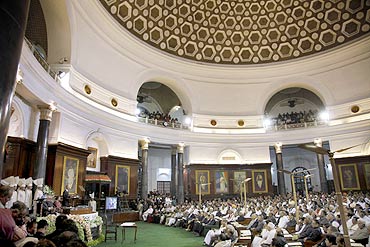
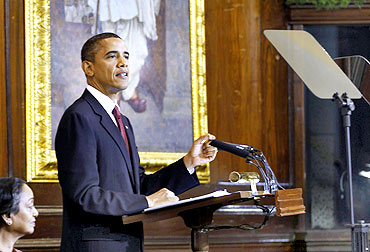
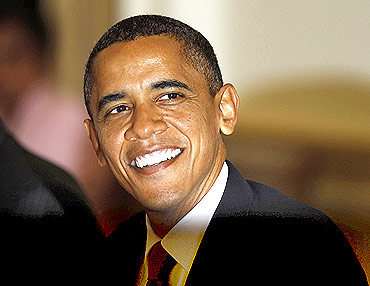

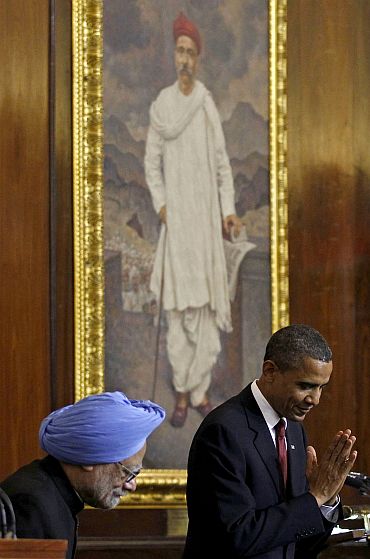
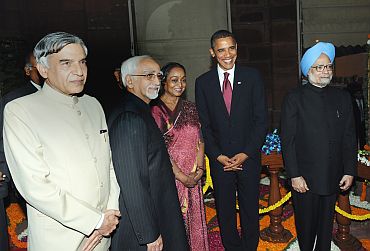
article